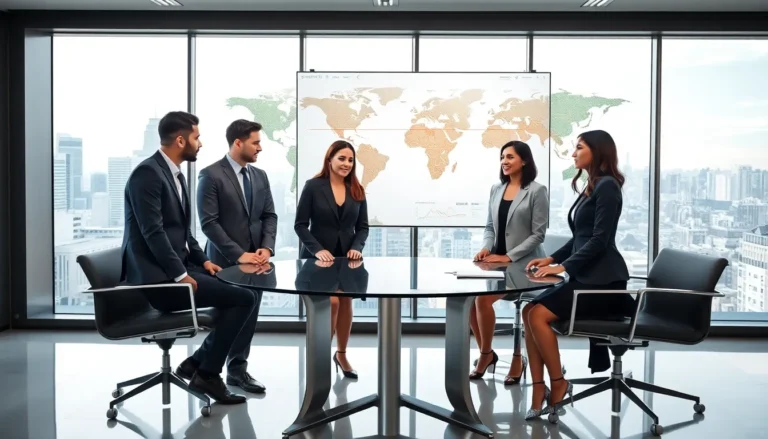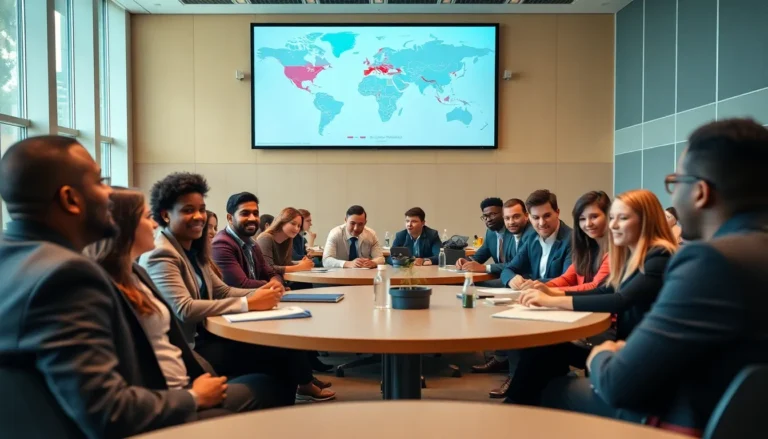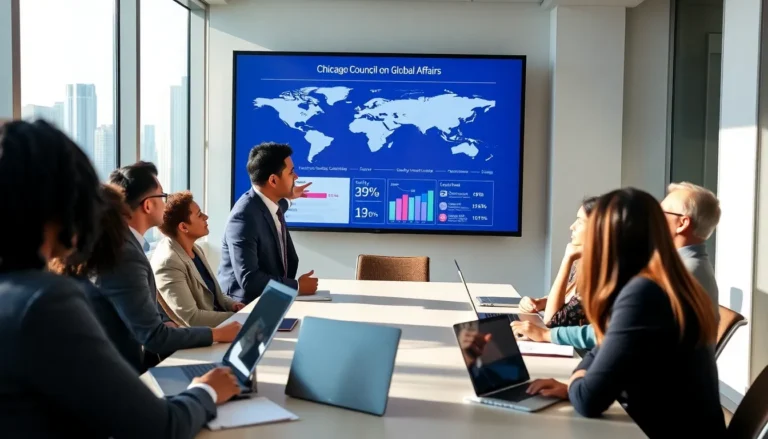Table of Contents
ToggleIn today’s interconnected world, the need for savvy global leaders has never been greater. A Master’s in Global Affairs isn’t just a fancy piece of paper; it’s a passport to understanding the complex web of international relations, economics, and cultural dynamics. Imagine diving headfirst into the thrilling chaos of global politics while sipping your favorite coffee—sounds enticing, right?
This degree opens doors to exciting careers, from diplomacy to international development, where one can make a real impact. Plus, who wouldn’t want to impress friends at parties by casually dropping terms like “geopolitical strategy” and “transnational governance”? Armed with this knowledge, graduates are not just participants in the global arena; they become influential players shaping the future. So, if you’re ready to take on the world (and maybe even save it), a Master’s in Global Affairs might just be the ticket you need.
Overview Of Masters In Global Affairs
A Master’s in Global Affairs equips individuals with expertise in international dynamics. This advanced degree covers multiple disciplines, including political science, economics, and cultural studies.
Definition And Scope
A Master’s in Global Affairs provides an interdisciplinary understanding of global systems. Typically, programs cover topics like international law, human rights, global security, and sustainable development. Students engage with case studies and real-world problems, preparing them to analyze complex global issues effectively. Coursework fosters critical thinking, research skills, and practical applications in various contexts.
Importance In Today’s World
In an increasingly globalized society, a Master’s in Global Affairs holds significant value. Graduates contribute to policy formulation and implementation at international organizations, governments, and NGOs. Understanding global currents enables them to address pressing challenges like climate change and poverty. This degree empowers individuals to impact international relations, making them pivotal in shaping future global frameworks.
Curriculum And Coursework
A Master’s in Global Affairs includes a robust curriculum designed to cover essential aspects of international relations. Students engage deeply with core subjects that shape their understanding of the global landscape.
Core Subjects
Core subjects lay the foundation for the degree. Courses typically include International Relations, which explores the interactions among nations. Global Economics covers the economic principles that drive global trade and development. Additionally, students study Comparative Politics, analyzing different political systems and their impact on global affairs. Human Rights provides context on ethical dimensions in international policies. By integrating knowledge from these diverse fields, the curriculum prepares students for multifaceted challenges in global affairs.
Elective Courses
Elective courses allow students to tailor their education to specific interests. Popular electives include Conflict Resolution, focusing on strategies to address global disputes. Environmental Policy examines the intersection of environmental issues and international governance. Students can also choose courses in Cultural Diplomacy, enhancing their understanding of soft power in international relations. Each elective promotes a deeper dive into relevant topics while enabling students to develop specialized expertise within the broader framework of global affairs.
Career Opportunities
Graduates of a Master’s in Global Affairs enjoy diverse career paths across multiple sectors. They find opportunities within international organizations, government agencies, NGOs, and the private sector.
Sectors Hiring Graduates
International organizations actively seek graduates for roles in policy development and program management. Government agencies employ experts for foreign service positions and diplomatic roles. NGOs require skilled professionals to address humanitarian issues and foster development projects. Additionally, private corporations look for individuals with a global perspective to navigate international markets and manage cross-border operations.
Potential Job Titles
Common job titles for graduates include policy analyst, where they assess international policies and their impacts. Project manager positions often involve overseeing global initiatives. Diplomat roles represent interests abroad while engaging in negotiations. Graduates might also take on consultancy roles, providing strategic advice to organizations on global trends. Other positions include researcher, evaluating data to inform decisions, and lecturer, sharing insights in academic environments.
Admission Requirements
Admission to a Master’s in Global Affairs involves specific criteria that candidates must meet. These requirements ensure that students are well-prepared for the program’s challenges.
Academic Qualifications
Candidates typically need a bachelor’s degree from an accredited institution. Acceptable fields of study often include political science, international relations, or economics. Some programs may accept degrees in other related areas, provided the candidate demonstrates relevant knowledge or experience. Academic performance generally requires a minimum GPA, often around 3.0 on a 4.0 scale. Additionally, applicants may benefit from having relevant coursework in statistics or research methods to strengthen their foundation.
Application Process
The application process usually involves several key components. First, candidates must complete an online application form, outlining their educational background and work experience. A personal statement often highlights motivation for pursuing a Master’s in Global Affairs, detailing career aspirations and relevant experiences. Most programs also require letters of recommendation, typically from professors or employers who can speak to the applicant’s abilities. Submitting standardized test scores such as the GRE may be necessary for some institutions, depending on their policies. Lastly, applicants may need to provide a resume or CV that showcases their professional experience related to global affairs.
A Master’s in Global Affairs offers a unique opportunity for individuals to engage with pressing global issues. By blending various disciplines it cultivates a well-rounded perspective essential for today’s complex world. Graduates emerge equipped not only with knowledge but also with the skills necessary to drive change across various sectors.
This degree opens doors to diverse career paths where graduates can influence policy and contribute to meaningful solutions. As the world continues to grapple with challenges like climate change and inequality the need for informed leaders in global affairs becomes increasingly vital. Pursuing this degree is more than just an academic endeavor; it’s a commitment to making a significant impact on a global scale.





